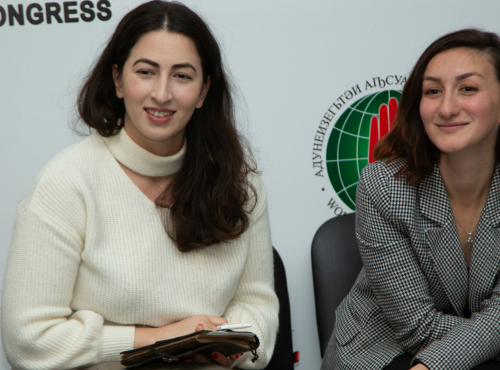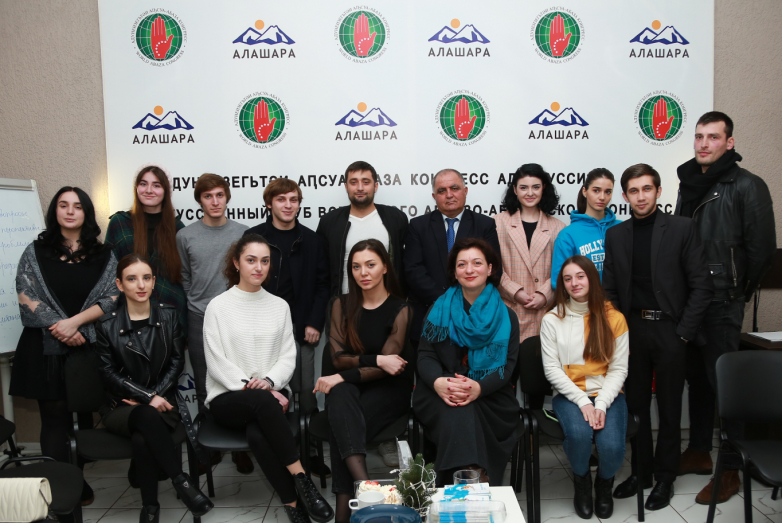Chairman of the State Committee for Ecology and Nature Protection of the Republic of Abkhazia Savely Chitanava became a guest of the WAC Discussion club as part of the club’s environmental section.
Said Bargandzhia
Ecological problems of Abkhazia were discussed by the members of the WAC club with the Chairman of the State Committee for Ecology and Nature Protection of the Republic Savely Chitanava on Thursday, February 13.
The meeting was almost entirely held in a question-and-answer mode. After a short opening speech, Savely Chitanava answered more than 20 questions in various fields of ecology and nature conservation.
“Even several days won’t be enough to discuss all the existing environmental problems, but we touched on the most urgent topics for Abkhazia: fishing season (the rules are often violated during the migration of fish and active fishing - ed.), violations as a result of various production activities. For example, the discharge of garbage into our rivers and the problems of garbage dumps relevant for Abkhazia. We paid special attention to the need to introduce environmental education in schools and kindergartens,” the official said.
The head of the Discussion club, Irina Turava, noted that the second meeting in the framework of the session “Ecology and Environmental Protection” confirmed a great interest in the chosen topic. It is to be recalled that the environmental direction was included in the work of the Discussion club based on requests from the population and at the request of potential members of the club.
“This topic is really relevant for our country, and the good news is that there were so many caring people who are willing to sacrifice their time in order to change the current environmental situation in our country. These are the people (members of the club - ed.) who really can change something. I hope that we will be able to work out a sustainable project on the topic of ecology that will work,” Turava said and added: “This is how I saw the format of work in the club at the development stage: a high-ranking official takes part in a conversation with concerned citizens and honestly answers all the questions that are interesting for them.”
A full video version of the club meeting is available on the YouTube channel of the WAC >>
A member of the WAC Discussion club Inal Tsabria is a student of the Faculty of Biology and Geography of the Abkhaz State University. The young man is interested in the subject of ecology and nature conservation since school time. This led him to the club.
“Abkhazia has valuable natural resources, and we need to learn how to use them rationally. Various organizations are trying to raise people’s environmental awareness by supporting nature and our resources, but after today's meeting it became clear that on environmental issues there is not enough legislation to protect our nature in order to preserve its uniqueness,” the student believes.
Another member of the Discussion club is Alisa Pachulia, who is also a member of the “Amch” public organization (from Abkhaz translated as “power” - ed.). In her opinion, the main advantage of the meeting was that the participants “managed to hear the official state position on many issues of ecology and nature conservation”, as well as talk about possible points of contact between relevant government agencies and public organizations and simply caring groups of people.
“Savely Chitanava expressed complete readiness to support any of our (members of the Discussion club - ed.) initiatives, and also said that if we have questions, we can contact him. I think we will be able to work together and, for example, [try to improve] informing the public, since there is this request from the public, but there is little information. We need reliable data that can always be viewed and analyzed,” said Pachulia.
The meeting lasted about two hours. Summing up its results, the club participants also discussed in which direction they should move further, in which environmental areas, they could implement a unique project upon completion of work in the club.
As the main directions of the work of the WAC Discussion club, in addition to the environmental one, the topics of preserving and developing the Abkhaz language, promoting the popularization of literature in the native language, preserving the historical and cultural heritage of the Abkhaz-Abaza ethnic group, developing and popularizing domestic science, and preserving the traditional moral and ethical code of Apsuara were previously selected. Club discussions as part of thematic sessions are held twice a month on Thursdays.


to login or register.